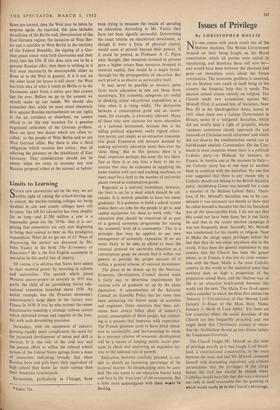Limits to Learning
Q EVEN new universities are on the way, we are 1../ within sight of raising the school-leaving age to sixteen, the teacher-training colleges are being doubled in size and county colleges have still to come. The bill for education has risen steadily for so long—and £1,500 million a year is a reasonable guess for the 1970s—that it is sur- prising that economists are only now beginning to bring their science to bear on this prodigious expenditure. What do we get out of it? Ways of discovering the answer are discussed by Mr. John Vaizey in his book The Economics of Education.* He is the first English economist to specialise in this useful line of inquiry.
Of course, it is obvious that States have added to their material power by investing in schools and universities. The sputnik which jolted Western amour-propre so severely in 1957 was partly the child of an astonishing Soviet edu- cational expansion launched about 1930. An earlier example was the Prussian elementary schoolmaster's large share in the victory over France in 1870. It was he who trained the minor functionaries manning a strategic railway system which delivered troops and supplies to the fron- tier with such devastating precision.
Nowadays, with the equipment of industry growing rapidly more complicated, the need for the increased development of talent and skill is obvious. It is one side of the cold war and the present effort to stiffen the relaxed school system of the United States springs from a mass of researches indicating broadly that when Russian boys and girls leave their equivalent of high school they know far more science than their American counterparts.
Economists, particularly in Chicago, have • Faber, 21s. been trying to measure the results of spending on education. According to Mr. Vaizey they have not been signally successful. Determining the exact returns on educational investment, as though it were a form of physical capital, would seem at present beyond their powers. If it could be proved, as Professor A. C. Pigou once thought, that resources invested in persons gave a higher return than resources invested in material capital, that would be a major break- through for the propagandists of education. But such proof is as elusive as personality itself.
It may never be possible to measure gains from more education as one can those from motorways. Yet economic categories are useful in thinking about educational expenditure at a time when it is rising wildly. The distinction between a consumption good and an invest- ment, for example, is extremely relevant. Many of those who now clamour for more education as a national investment, because this is the telling political argument, really regard educa- tion purely and simply as an attractive consump- tion good. Expansion will increase demand by making university education more than ever the 'done thing.' But to this process there is a limit, imprecise perhaps, but none the less there. Just as there is at any time a limit to the re- sources that may be expended in supplying the home market with cars and washing machines, so there must be a limit to the number of university places viewed as consumption goods.
Regarded as a national investment, however, the limit is set by a need which should be cal- culable. It is entirely possible to have too many graduates. 'It is pointless to build a school system unless there are jobs for the people to go to, and capital equipment for them to work with.' An education plan should be conceived of as part of a general economic programme for raising the economic level of a community.' This is a principle that may be applied to our own management of university expansion. If we are never likely to be able to afford to meet the eventual demand for university education as a consumption good, we should find it within our powers to provide the proper amount of it within a general scheme of national investment.
The plans, to be drawn up by the National Economic Development Council should make it fairly easy to determine requirements for various sorts of graduate set up by the plans themselves. A subcommittee of the Advisory Council on Scientific Policy has for some time been estimating our future needs of scientists and engineers. Some maintain that these esti- mates have always fallen short of industry's actual consumption of these people, but estimat- ing is a process that improves with experience. The French planners seem to have fitted educa- tion in successfully, and incorporating its needs in a national scheme of economic development will be a means of keeping purely social pres- sures in check and anchoring an expensive ser- vice to the national rate of growth.
Education, however carefully planned, is cer- tain to absorb an increasing percentage- of the national income. Its housekeeping must be justi- fied. No one wants to see education bound hand and foot by the 'iron laws' of the economists. But a little more acquainlance with them woold be healthy.


































 Previous page
Previous page